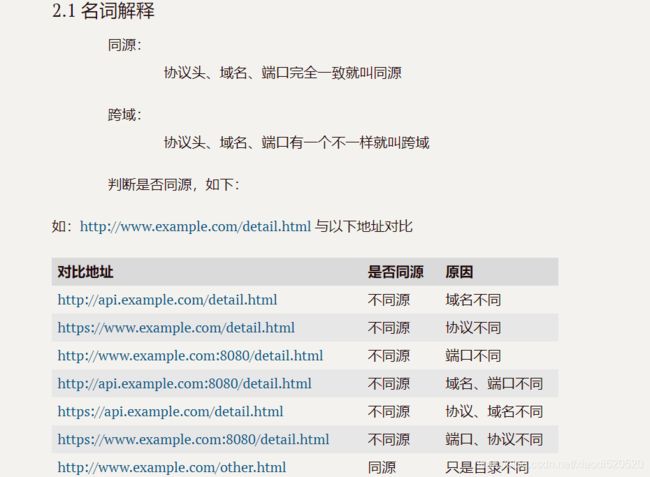ajax总结(三):ajax跨域访问接口方法汇总
ajax跨域访问接口方法和模板引擎的应用
一.学习跨域之前先要了解:
1.同源和跨域的概念
a.同源:协议头、域名、端口全部一样就叫同源;
b.跨域:只要协议头,域名,端口任意一个不一样就是跨域.
因为跨域的影响,导致浏览器出于安全角度考虑,不允许你用ajax(XMLHttpRequest)访问跨域的资源.
来一张图来说明 :
:
(如果使用了跨域,会报"No ‘Access-Control-Allow-Origin’ header is present on the requested"的错误)
二.解决办法:
1.跨域方案之一:JSONP方法
JSONP的优点是:它不像XMLHttpRequest对象实现的Ajax请求那样受到同源策略的限制;它的兼容性更好,在更加古老的浏览器中都 可以运行,不需要XMLHttpRequest或ActiveX的支持;并且在请求完毕后可以通过调用callback的方式回传结果。
JSONP的缺点则是:它只支持GET请求而不支持POST等其它类型的HTTP请求;它只支持跨域HTTP请求这种情况,不能解决不同域的两个页面之间如何进行JavaScript调用的问题。
具体介绍:
a.它是一套用script标签解决跨域问题,得到JSON数据的方案
b.用法:就是用script标签的src属性去访问跨域接口,然后在后面加一个参数叫callback,传入一个函数名字,当响应完成是它会自动调用这个函数,并把JSON数据当作参数传递给这个函数.
演示案例:
<script>
function test(obj){
console.log(obj); //可以正常得到接口里的数据
}
</script>
<script src="http://api.douban.com/v2/movie/top250?callback=test"></script>
c.怎么看能不能用JSONP?就是看文档,没文档就试一下行不行不就知道了嘛.
d.如何在事件里发JSONP?
解决方法:只要在事件里创建script标签,然后给它一个src属性,再加到页面中就可以了.
演示代码:
<body>
<input type="text" id="qq">
<input type="button" value="点我发请求" id="btn">
</body>
</html>
<script>
function f1(obj){
console.log(obj);
}
var qq = document.getElementById('qq');
//如何在事件里发JSONP的请求
document.getElementById('btn').onclick = function(){
//我可以再这里面自己创建一个script标签
var spt = document.createElement('script');
spt.src = "http://api.douban.com/v2/movie/top250?callback=f1"
console.log(spt);
document.head.appendChild(spt);//注意是在head里面加script标签
}
</script>
e.也可以用jQuery发jsonp请求,而且代码更加简洁.
$.get({
url:"http://api.douban.com/v2/movie/top250",
dataType:"jsonp",
success:function(obj){
console.log(obj)//成功拿到数据.
}
})
$.ajax({
type: 'GET',
url:'http://api.douban.com/v2/movie/top250',
dataType:'jsonp',
jsonp:"callback",
data: {
q: "select * from json where url=\"http://v.juhe.cn/toutiao/index?type=shehui&key=989c40de0a1c5c3618f9469e8271f488\"",
format: "json"
},
success: function(data) {
console.log(data);
},
error: function(error) {
console.log(error);
}
});
2.跨域方案二:CORS方法
a.原理:让服务器告诉浏览器,我这个接口所有网站都可以访问!
b.方法:在后台里加上一句话:header(‘Access-Control-Allow-Origin:*’);
演示案例
后端:

前端 :

3.跨域方案三:利用服务器当跳板去访问接口
原理:
跨域只是浏览器的限制,但是我自己的服务器可以去访问别人的接口,我们访问自己服务器,让自己的服务器去访问接口,然后返回的数据再返回给服务器.
后台核心代码,将结果echo输出就可以:
<?php
$qq = $_GET['qq'];
//去访问别人的接口
//读取文件的内容
//参数:文件的路径
//其实,它本质上是发起一个请求,读取到响应体而已
// $res = file_get_contents("1.txt");
$res = file_get_contents('http://japi.juhe.cn/qqevaluate/qq?key=8d9160d4a96f2a6b5316de5b9d14d09d&qq='.$qq);
echo $res;
三.模板引擎的使用(重要)
1.模板和引擎的意思
模板:先写好一套HTML结构,但是数据不要写死,而是挖几个坑,然后你给我什么数据,我就填充到坑里面去,就能生成不同的页面结构了.
引擎:就是实现上面模板功能的插件,就叫引擎.
2.模板引擎有很多个,我用的是art-template这个模板引擎,因为它小,功能又强大,关键是还有中文的文档.(官方网站:https://aui.github.io/art-template/zh-cn/docs/index.html#模板);
3.使用步骤:
共三步:
a.导入模板引擎
在html里写:
<script src="./js/template-web.js">script>
b.准备一个模板,注意点:
用script标签来准备,并且必须给type属性,而且type属性不能是text/javascript,再给一个id;
在标签里写你需要的HTML模板.
在html里写:
<script type="text/html" id="tp1">
{{each list value}}
<div class="item clearfix">
<a href="#" class="title">
<img src="{{value.img}}" alt="">
<span>{{value.time}}</span>
</a>
</div>
{{/each}}
script>
3.调用模板,并且给模板传递数据,它就能生成对应的HTML代码了
使用template调用
演示代码:
在js里写:
xhr.onload = function () {
// console.log(xhr.responseText);
var obj=JSON.parse(xhr.responseText);
console.log(obj);
//调用模板
var html=template('tp1',{list:obj.items});
// console.log(html);
items.innerHTML+=html;
}
附什么值得买网站模板引擎的应用案例:
<html>
<head>
<meta charset="UTF-8">
<title>SMZDMtitle>
<style>
.items {
display: flex;
flex-wrap: wrap;
}
.item {
/*float: left;*/
width: 320px;
/*height: 320px;*/
border: 1px solid #0094ff;
overflow: hidden;
margin: 10px 20px;
}
.item .title {
display: block;
width: 100%;
position: relative;
}
.title img {
display: block;
width: 100%;
}
.title span {
position: absolute;
right: 20px;
bottom: 0px;
width: 50px;
text-align: center;
background-color: lightgray;
color: gray;
font-size: 13px;
border-radius: 5px 5px 0 0;
}
.content {
padding: 10px 0;
}
.content a {
text-decoration: none;
color: black;
font-family: "微软雅黑";
font-size: 16px;
}
.content p {
color: gray;
font-size: 13px;
font-family: "微软雅黑";
margin-bottom: 0;
}
.f_l {
float: left;
}
.f_r {
float: right;
}
.clearfix::before,
.clearfix::after {
content: '';
display: block;
line-height: 0;
height: 0;
clear: both;
visibility: hidden;
}
.clearfix {
zoom: 1;
}
.info {
line-height: 25px;
}
.info img {
width: 20px;
height: 20px;
vertical-align: middle;
margin-right: 10px;
}
.info a {
color: gray;
text-decoration: none;
font-size: 12px;
height: 20px;
line-height: 20px;
margin: 0 10px;
}
.getMore {
width: 100px;
height: 100px;
border: none;
text-align: center;
background-color: hotpink;
line-height: 100px;
cursor: pointer;
font-size: 20px;
font-weight: 900;
}
.getSome {
width: 100px;
height: 100px;
border: none;
text-align: center;
line-height: 100px;
cursor: pointer;
font-size: 20px;
font-weight: 900;
position: relative;
background-color: #222222;
color:#c0c0c0;
z-index: 2;
}
.getSome img{
position: absolute;
top:0;
left:0;
width: 100%;
height: 100%;
opacity: .5;
}
.controls {
display: flex;
}
style>
head>
<body>
<div class="controls">
<div class="getSome">
加载更多
<img src="./imgs/loading01.gif" alt="">
div>
div>
<div class="items">
div>
body>
html>
<script src="js/template-web.js">script>
<script type="text/html" id="tpl">
{{ each list value }}
<div class="item clearfix">
<a href="{{value.article_link}}" class="title">
<img src="{{value.article_pic}}" alt="">
<span>{{value.article_date}}</span>
</a>
<div class="content">
<a href="#">{{value.article_title}}</a>
<p>{{value.article_content}}</p>
</div>
<div class="info clearfix">
<a href="#" class="f_l"><img src="{{value.icon}}" alt="">{{value.article_referrals}}</a>
<a href="#" class="f_r">信息:1</a>
<a href="#" class="f_r">❤:2</a>
<a href="#" class="f_r">赞:3</a>
</div>
</div>
{{ /each }}
script>
<script>
//获取容器
var items = document.querySelector('.items');
//获取更多的点击事件
document.querySelector('.getSome').onclick = function(){
//1. 创建请求对象
var xhr = new XMLHttpRequest();
//2. 设置请求行
xhr.open('get','https://www.smzdm.com/homepage/json_more?timesort=154209876095&p=2');
//3. 设置请求头,post才需要
//4. 发送请求
xhr.send();
//5. 监听响应完成
xhr.onload = function(){
// console.log(xhr.responseText);
// 转成JS数据
var obj = JSON.parse(xhr.responseText);
console.log(obj);
//调用模板
var html = template('tpl',{ list: obj.data});
items.innerHTML += html;
}
};
script>
